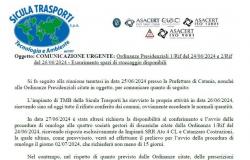Don’t expect Humphrey Bogart in a bow-tie exclaiming into the phone: “It’s the press, darling!” nor Redford/Woodward in a dark garage waiting for “Deep Throat.”
If anyone ever takes the trouble to write the story of these days seen from the inside, they will tell of the Italian heat at the end of June, mitigated by the air conditioning which always displeases a couple of people.
He will talk about phones that vomit social notifications, he will talk about scribbling on notepads while listening to certain endless meetings. He will tell you about deadlines to meet. He will talk about the anxiety of checking that everything is in order before exporting a movie: “Did you also do the vertical one?”.
And he will tell you about the messages from those who ask you – because there is always someone who does, and that’s a good thing – if you’re coming back late tonight.
The journalistic method in Fanpage and the investigative unit
Anyone who tries to analyze a “journalistic method” must do so carefully: anyone who has ever frequented an editorial office knows that newspapers are the chemistry of those present. An investigation, a report, a correspondence, an editorial are influenced by the ideas, the discussions, the internal climate of an editorial office.
The first truth to start from emerges: those who work at Fanpage.it have the theme of anti-fascism very much at heart.
An anti-fascism in line with the Italian Constitution which guarantees in its famous article 21 (also) the freedom of the press which «cannot be subject to authorization or censorship». From the Charter comes law number 69 of 1963, the beacon (for now) of the profession which establishes the «irrepressible right» of journalists to freedom of information and criticism.
Pay attention to the term “irrepressible”. It’s a beautiful adjective. It smells of clandestine mimeographs printed in a farmhouse and distributed at night by bike, defying the curfew, when a free and non-regime press was a duty and a necessity that could even be paid for with one’s life.
A second truth emerges: whoever conceived, created and financed Fanpage.it believes in that adjective. And he knows that for this freedom he can also risk paying a certain price. Even today, even if we are in a democracy.
But why, how much does freedom of the press cost? I am not just talking about complaints, reckless or otherwise, I am not just talking about requests for compensation or pressure of various kinds. The truth is that there are various prices to pay. I will try to explain some of them.
Some of the best investigative experiences come from «investigative unit» that exist in many large newspapers around the world – Fanpage’s is called Backstair -. The investigative units have different times compared to the news and in general slower than those of the newspaper machine as a whole. They are, generally, more expensive and do not always bring results. In fact, situations can arise in which the investigations and in-depth analyses started turn out to be flops and a job on which time and resources have been invested ends up leading to a dead end. In those cases it is right to turn the page without getting too worked up.
It is through investigation that the character of the reporter is tested. Because you must want an investigation. You have to look for it. You have to defend it. You have to support her morally and sometimes even financially and I’m thinking of the many freelancers who work on huge in-depth studies.
It’s not blind obstinacy, let’s be clear, but if the facts show you that there is something, you have to carry out an investigation. Even for a long time. You don’t stop if you think that the path is the right one; after all, the journalist’s job is to dig. In some cases you just have to patiently wait for the work to bear fruit.
Think of the “Boston Globe” and Spotlight, the investigative unit that uncovered cases of child abuse in the American Catholic Church. Think of the “Panama Papers” on tax havens around the world that emerged in the investigation conducted by the International Consortium of Investigative Journalism. Enormous work, impossible without committing professional and economic resources, impossible without committing time for checks, checks, connections, testimonies, stakeouts, analysis of documents and data.
The legitimacy of the Fanpage investigation “Gioventù Meloniana”
We therefore come to the latest Fanpage investigation, «Gioventù meloniana» focused on the story of “Gioventù Nazionale”, the youth section of Fratelli d’Italia, the majority party in our country which represents the Prime Minister, half of the government and part of the class Italian manager. The investigation was possible because a journalist infiltrated the structure starting from an unpaid collaboration with an area newspaper.
The profile of the undercover reporter was that of a young moderate: a liberal with right-wing ideas, but far from extremism of any kind. How the story went is now clear: the undercover professional is gradually introduced into a world of the extreme right in which there are people who are not ashamed to declare and show all their appreciation for Nazi-fascism swept away by History but evidently still alive in certain environments.
Let’s leave aside the content of the two episodes, we’ve already talked about it. Let’s look at the technique and the regulatory context of reference. If you take a look at the law that regulates journalistic work in Italy, written over sixty years ago, you realize how well it is written. The rights of journalists to publish, as we said before, are “inalienable”. As long as the “substantial truth of the facts» e «always observe the duties imposed by loyalty and good faith».
Is what Fanpage published true? Absolutely yes. Have the duties imposed by loyalty and good faith been respected? Absolutely yes.
And now we come to an argument raised by those who – for political and ideological convenience – have tried to denigrate the investigative work, namely the use of an undercover journalist. Some politician, in a childish attempt to discredit the investigation, has reduced it to a moment in which the good faith of naive and candid girls and boys would have been almost stolen.
This is not the case, obviously: if the story was published it is because it was important to bring it to light and because the people involved have public roles on the Italian right. The journalistic investigation undercover It’s not a game and it’s not even an easy choice. We live in times where with two clicks you can know the life, death and miracles of a person, therefore immersing yourself in a context with the idea of telling it has its stresses. And its risks. It is not even a miraculous catch because as already said sometimes you get nothing from the work done and you have to let it go.
The consolidated text of the duties of the journalistor the ethical-deontological foundation of the profession in Italy, requires those who do this work to «However, always make your identity and profession known when gathering news». It is not easy to deviate from this rule. But one is calm in doing so. when there is an element that is fundamental in our work: the clear and relevant public interest. Is it relevant to know what happens in the youth section of the first political party in our country? Yes. I would like to know if anyone praises Mussolini, Hitler, the dissolved fascist party banned by law and has a role in Italian politics, aspires to climb the party hierarchy or even to run for office.
Why Fanpage does undercover journalism
Why, then, the choice to go undercover? There are cases in which it is impossible for a reporter to start an investigation by presenting himself/herself with his/her true identity. I «Sieg Heil» Nazis, hands outstretched in the Roman salute, the «Duke, Duke!», the fascist chants, the disgusting xenophobic and anti-Semitic speeches would they ever come to light in front of a notebook or a camera? The question is rhetorical, the answer is obvious: absolutely not.
This thesis is confirmed by some of the subjects involved in the investigation, who show scrupulous attention in presenting themselves in a certain way to journalists and adopt completely different behaviors when they are outside the direct observation of subjects external to the circle.
The meaning of the Fanpage investigation work is all here: unmask a blatant duplicity, a profound hypocrisy, a tried and tested factory of ideological double-bottoms. Only possible with this method, only with this technique.
“It is allowed?” he asked rhetorically and publicly Georgia Meloni, addressing the President of the Republic, with a question as violent as a guilt. The Prime Minister, who is also a professional journalist, should know this: the undercover investigation has existed for almost 140 years, given that the first major investigation dates back to the year 1887, published in the New York World by a certain Joseph Pulitzer whose name is today linked to one of the most important journalism awards in the world.
How many things would we not have known without undercover journalists? Lots. Surely today we know one in Italy thanks to the work of Fanpage: Fratelli d’Italia has a serious problem with its youth sector.
Surely another thing is also clear to many beautiful souls: Investigative journalism doesn’t ask anyone’s permission. He didn’t ask members of the Democratic Party (“Bloody Money” reminds you of anything? And the primaries of the Democratic Party in Naples?) and he didn’t even ask leaders and elders of the Brothers of Italy.
If anyone will take the trouble to write the story of these days seen from the inside, they will tell the great professionalism and – all in all – the serenity with which Selena Frasson, Arsenio Imperioso, Cristiana Mastronicola, Luigi Scarano, aka Fanpage’s current Backstair team, led this work and faced the enormous pressure that followed. Serenity which in journalistic work is the result of editorial freedom, without which you can’t go anywhere.
A few months ago the Head of State Sergio Mattarella had to say about freedom of the press in Italy that, as an “indispensable” element of our democracy, “it is important to the institutions, each called upon to protect it in their own skills and areas and, naturally, in their own responsibilities».
Let this be enough to reassure every journalist and every young aspiring Italian reporter: the compass points towards the Quirinale and the words of the President of the Republic.
As long as this remains the case, in the editorial office we will still be able to say with relative ease the most important sentence that can be uttered in a newspaper: “Okay, let’s publish it.”
Professional journalist, head of Naples news at Fanpage.it. He teaches ethics and deontology of journalism at LUMSA. He is the author of the book “If I could, I would give you Naples” (Rizzoli). He has a newsletter entitled “Greetings from Naples”. He won the Giancarlo Siani Journalism Award in 2007 and the Paolo Giuntella and Marcello Torre awards in 2012.







